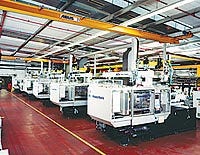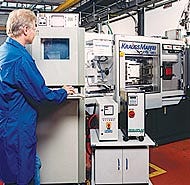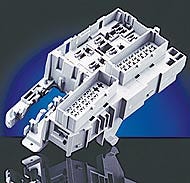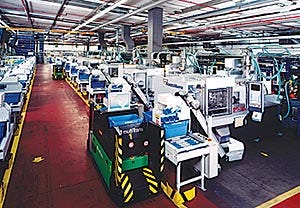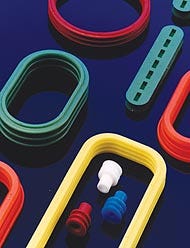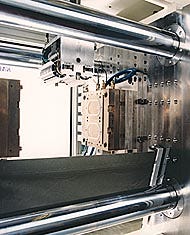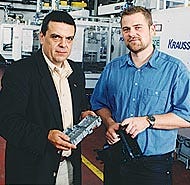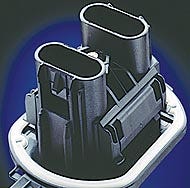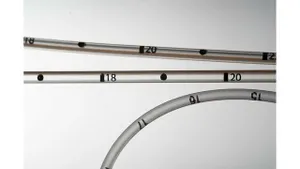Plant Tour: Molder's playground, development hotbed
One of the main molding halls at the Wuppertal plant has 54 thermoplastic injection machines on one side and 24 liquid silicone rubber (LSR) machines on the other side.
July 1, 2001
|
One of the main molding halls at the Wuppertal plant has 54 thermoplastic injection machines on one side and 24 liquid silicone rubber (LSR) machines on the other side. |
Even if you are not working in the automobile market, you've probably heard of Delphi Automotive Systems. With more than 200,000 people in 40 countries, the company is hard to miss. It has more than 180 production locations, 31 technology centers, and is involved in more than 40 joint ventures. Technical Centers, such as the one IMM visited in Wuppertal, Germany, are evidence of Delphi's total commitment to being a complete systems supplier. The capabilities of the Wuppertal center, which serves Europe and the surrounding area, span everything from basic research and product design to component production, full assembly, and extensive testing.
Wuppertal is at the heart of the Ruhrgebeit, the area around the Ruhr River that became the hub of German industry in the 19th century. International transportation is available and the University of Wuppertal and other institutes in the area provide a source of talent to tap. The Technical Center began operation in March 1997. It has more than 100,000 sq m of space, of which nearly 8000 sq m is lab and test facilities. It houses about 500 product and mechanical engineers from the three Delphi divisions—Delphi Interior & Lighting, Delphi Packard Electric, and Delphi Delco Electronics—that are also located here. Almost every nationality in Europe is found in the staff, and most employees speak at least two languages.
Active as a manufacturing site from the early 19th century, Delphi Wuppertal has been molding plastic since 1965. It is fair to say the pace has been significantly intensified in recent years. The range of products includes electrical housings and assemblies, drive systems, switches, sensors, and cockpit modules. In one production hall there are 54 thermoplastic injection machines from 20 to 650 tons on one side, and 24 LSR machines from 50 to 100 tons on the other side. Delphi operates three shifts seven days a week, or as Plant Manager Stefan Schweitzer says, it has 168 hours of production in a week.
Small machines are the focal point here, but beyond that Delphi says the number of designs for small and micro parts, many with shot sizes of 1 to 3g, is increasing. So too is part complexity. Wuppertal currently has a 30-ton Krauss-Maffei C Series machine with an 18-mm screw in operation. Benchmarking is under way with other small systems, including tabletop units.
On the other end of the spectrum, the largest machine in the production area, a 650-ton Krauss-Maffei, has a 1.8-kg (63-oz) shot capacity. The largest part Delphi is currently making here weighs .5 kg (18 oz).
VITAL STATS |
Delphi Automotive Systems GMBH, Wuppertal, Germany |
Square footage: |
Markets served: |
Materials processed: |
Raw material used: |
No. of employees: |
Shifts worked: |
Molding machines: |
Molding technologies: |
Secondary operations: |
Internal moldmaking: |
Quality: |
Growing with New Technologies
Currently active technologies include two-component plastic applications, liquid silicone rubber (LSR) with thermoplastic multimaterial molding, micromolding, and very recently the production of MID (molded interconnect devices). For technologies like these, the Wuppertal technology center provides the development and support for Delphi's many production operations in and around Europe. Project Manager Stephan Rönisch says there is a constant effort to integrate components. For example, injection molding an elastomer seal onto a glass-filled nylon part has eliminated the possibility of the seal not being with the part when assembly takes place. The part is now made in a dedicated production cell.
MID development has been done in cooperation with the University of Erlangen, which has been active in the research and development of this technology from its inception. Rönisch says, "MID is a technology for the future. It integrates high functionality into 3-D circuit carriers that allow optimal miniaturization." Integrating circuit paths with thermoplastic carriers in a strip connector, for example, made it possible to reduce weight and expand design freedom while gaining distinct cost advantages. Much of the MID molding has been in nylon, but Delphi is becoming more involved with LCP for these projects.
LSR molding is a Delphi specialty. The Wuppertal plant has been molding LSR into compression seals, gaskets, O-rings, and a variety of cable-end closures for more than 10 years. The Wuppertal Technical Center has developed foamed LSR applications, such as a sealing gasket with an adjustable size and shape for various parts without the need for separate tooling. Two-component LSR molding projects are also active now.
|
|
Gas-assist molding is one of the many new technologies brought into production after being evaluated and tested in the development center. | Complex electrical connector blocks like this one are a Delphi specialty. The Wuppertal development center is bringing higher-performance materials into production to answer automakers' more demanding requirements in electrical/electronic systems. |
| |
The AGVs (automated guided vehicles) shown here bring empty parts containers to the smaller injection machines and take filled ones first to quality control and then to finished goods inventory. |
Automated Efficiency
Ultra-efficient organization of workspace is given a high priority at Delphi. Productivity per unit of floor space is maximized through automation that allows relatively close placement of machines. In Wuppertal, AGVs (automated guided vehicles) are used to bring empty parts containers to the machines and take full ones first to quality control and then to the finished parts area. The machines are grouped by size, allowing the AGVs to work easily with the smaller machines. Larger parts are not suitable for the AGVs.
All machines are networked to a central computer system so that real-time production data is always available. There are alarm presets in the central system and if a problem is detected with a critical parameter, a technician will make adjustments using the machine controller.
Delphi designs its own automation systems in its internal manufacturing engineering group and the components are then bought from the best supplier of that particular technology. The robots on the molding machines generally do a lot more than pick and place. For example, insertion of wire pins in molded connectors was formerly a separate time- and labor-consuming operation. Robots at the machines now insert the pins to be encapsulated during the molding process. The robots are programmed to perform this function for the large variety of connectors Delphi makes and will vary the pin count, type, size, and pattern as needed for any part.
In one automated sequence, pins are inserted into the mold as the robot is extracting the just-molded part. While the mold is closed, additional terminals are inserted and the entire piece is visually inspected for pin count and accuracy. Defective parts are automatically removed. In the end, molded LSR parts are automatically combined by industrial robots from ABB with plastic parts like nylon connector blocks.
Flexibility is the key to other automation projects as well. Delphi acquired three new Krauss-Maffei C Series machines last year to create a three-machine production cell. The cell is designed so that each machine also can be used independently to produce a variety of parts. Krauss-Maffei also supplied the automated parts transportation system that enables fully automated operation in either cell or independent mode.
Delphi is currently replacing its older B Series K-M machines with models from the current C Series. In general, Schweitzer sees machines having about a 10-year life with Delphi, though that will vary as technology changes. The LSR machines are principally from Arburg. Delphi decided a few years ago to reduce the number of its suppliers, including machines, to reduce the administrative and management load.
|
|
Delphi began working with LSR in Wuppertal 10 years ago and now has 24 machines producing a wide variety of products around the clock, including multimaterial applications with thermoplastics. | LSR molding is an integral part of Delphi's production operation. Specially designed parts removal systems, such as the one shown here, have been developed to shorten overall cycle time while protecting the molded part from damage on removal. |
|
|
Stefan Schweitzer (left) is plant manager for Delphi's molding operations in Wuppertal. With him is Stefan Rönisch who, as LSR project manager, handles development of new applications, including overmolding and multicomponent projects. | Delphi has become adept at overmolding integral seals with LSR gaskets. Such designs save Delphi's customers considerable assembly time and eliminate problems caused by missing sealing gaskets. |
Understanding the Mold
There are 168 people working in the molding plant, nearly 100 of whom work directly on the production floor. The rest are in administration, tooling maintenance, and sales. Delphi's moldmakers, numbering close to 50 and working in a separate building, produce up to 50 percent of the company's plastics molds. All of the LSR molds Delphi runs are produced internally. The moldmaking shop is equipped with current generation high-speed machining, erosion and wire EDM, high-speed machining centers with automated tool changing, and so forth. There are no machines older than three years. In all, there are more than 1200 active molds in the plant, 400 of which are run at least once a month. Modular molds have been steadily increasing thanks to the flexibility they grant production planners.
All the molds used in other European Delphi plants go through final debugging at Delphi Wuppertal. The Technikum, or development center, has 18 injection machines (not included in the count of production units) that are used for various benchmarking tests. Viscosity testing and moldfilling analysis using Moldflow are done to understand material rheology during molding. Other techniques used include color spectrum and thermal analysis studies. Technikum manager Jürgen Pscheidt says the development center's role is to establish mold and machine standards so production can have fast, clean startups.
Delphi has paid particular attention in recent years to mold cooling. Innova's Contura technology, for instance, which adapts the shape of the cooling channels to the shape of the molded part, has shown substantial cycle-time savings and quality improvement. On one connector housing, the Innova system reduced cooling time from 48 to 25 seconds, lowering overall cycle time from 72 to 49 seconds. Innova technology also has enabled Delphi to switch a gas-assist part to straight injection molding. Delphi uses infrared imaging to verify the cooling designs for such parts.
R&D Commitment
Delphi Wuppertal processes more than 2000 tons of materials annually and is currently working with 43 base materials in 80 to 150 grades, depending on how you count fillers and additive variations. The highest-volume material has been nylon, followed by PBT and ABS. Increasing underhood temperature requirements from automakers have caused Delphi to replace nylon with PBT in a number of applications, particularly where high moisture resistance is needed.
Continued R&D is a way of life at Delphi because of its selected market position as a leader in electrical and electronic assemblies and subsystems for automobiles. Delphi's strategy is to help lead its customers to newer technologies, not to wait for the client to put in a request. Benchmarking tests of materials, moldmaking and molding technologies, and assembly techniques are started in anticipation of demand.
For instance, fuel cell development, one of the most talked about of the current automotive technologies, has been an active project at Delphi Wuppertal for some time. Delphi's use of PBT as an alternate material was also in answer to a pending demand. With client temperature specifications reaching 200C and higher for components like lamp sockets, Delphi saw the need for a higher-performance material. Delphi is working with PPA, PES, and others. Since these materials are almost all higher in cost than what they'll replace, Delphi will accompany these material developments with cost containment through manufacturing efficiency and zero waste. Schweitzer notes that with material prices ranging from less than 2 DM/kg to more than 50 DM/kg ($.50 to $12/lb), cost-performance ratios are an important part of the final product cost.
Automakers, eager to put more comfort and performance features into each car, continue to move away from relatively simple electrical wire/cable connections as they put more electronics into a car. For Delphi, this provides challenges not simply in new product design but in increasing overall assembly and individual component quality. As the system becomes more complex and integrated, the need for failure proofing becomes absolute.
Delphi Wuppertal is clearly on a growth track. The plastics molding area will add approximately 10 new machines this year. LSR operations could conceivably double within a year or two. In terms of technology, it is fair to say that Delphi is working with everything except one: the all-electric machine. Rönisch says the company still does not see enough advantage to justify the cost of the machines, even with the understood energy savings. Hybrids, however, are in consideration and will be a topic of discussion at an upcoming Delphi global molding conference. With the continuing trend toward building vehicles with fewer but larger component systems, European OEMs will be looking more and more to the resources and know-how of suppliers like Delphi.
Contact information |
About the Author(s)
You May Also Like
